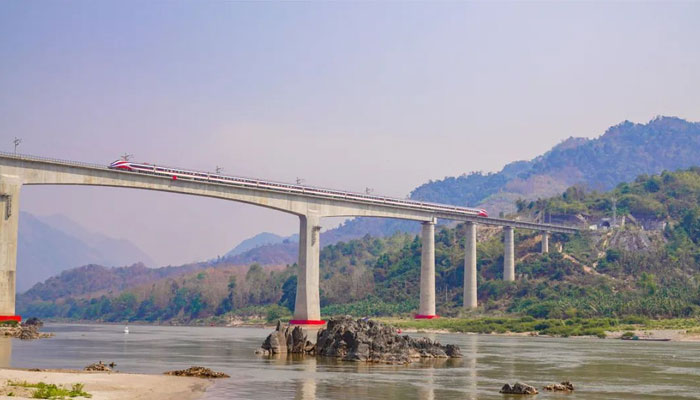Tensions simmering in South China Sea, Myanmar as Laos takes ASEAN chair
BANGKOK: Simmering tensions in the South China Sea between China and several Southeast Asian nations now regularly spark direct confrontation. Fighting in Myanmar against the military government that seized power three years ago has grown to the point that most say the country is now in a civil war.
Hopes were high that Indonesia might be able to make significant inroads on both issues during its 2023 chairmanship of the Association of Southeast Asian Nations, using its clout as the bloc’s largest country, but little progress was made. Now Laos, the bloc’s poorest and one of its smallest countries, has taken over the rotating chair.
As foreign ministers gather in Luang Prabang for this year’s first top-level meetings over the weekend, many are pessimistic that ASEAN can keep its biggest challenges from festering and growing. “There were so many expectations when Indonesia started its presidency and some of those expectations fell short,” said Shafiah Muhibat, an expert with the Centre for Strategic and International Studies in Indonesia. “So with Indonesia moving on to Laos, I think the expectations are quite low in terms of what Laos can actually do.”
After the military seized control of Myanmar in February 2021 from the democratically elected government of Aung San Suu Kyi, ASEAN — comprised of Indonesia, Thailand, Singapore, the Philippines, Vietnam, Malaysia, Myanmar, Cambodia, Brunei and Laos — came up with a “Five-Point Consensus” plan for peace. The military leadership in Myanmar has so far ignored the plan. At the same time, a humanitarian crisis is growing, with more than 2.6 million people forced from their homes due to escalating violence, according to the United Nations.
Indonesia, despite touting more than 180 “engagements” with stakeholders in Myanmar, was unable to achieve a breakthrough.
ASEAN’s plan calls for the immediate cessation of violence, a dialogue among all concerned parties, mediation by an ASEAN special envoy, provision of humanitarian aid through ASEAN channels, and a visit to Myanmar by the special envoy to meet all concerned parties. “ASEAN actually has very little leverage on Myanmar; Myanmar doesn’t care about ASEAN at all,” said Muhammad Faizal, with the Institute of Defense and Strategic studies at the S. Rajaratnam School of International Studies in Singapore. “They don’t give a hoot about the five-point consensus.”
-
 Benny Blanco Addresses ‘dirty Feet’ Backlash After Podcast Moment Sparks Online Frenzy
Benny Blanco Addresses ‘dirty Feet’ Backlash After Podcast Moment Sparks Online Frenzy -
 Sarah Ferguson Unusual Trait That Confused Royal Expert
Sarah Ferguson Unusual Trait That Confused Royal Expert -
 Prince William, Kate Middleton Left Sarah Ferguson Feeling 'worthless'
Prince William, Kate Middleton Left Sarah Ferguson Feeling 'worthless' -
 Ben Affleck Focused On 'real Prize,' Stability After Jennifer Garner Speaks About Co Parenting Mechanics
Ben Affleck Focused On 'real Prize,' Stability After Jennifer Garner Speaks About Co Parenting Mechanics -
 Luke Grimes Reveals Hilarious Reason His Baby Can't Stop Laughing At Him
Luke Grimes Reveals Hilarious Reason His Baby Can't Stop Laughing At Him -
 Why Kate Middleton, Prince William Opt For ‘show Stopping Style’
Why Kate Middleton, Prince William Opt For ‘show Stopping Style’ -
 Here's Why Leonardo DiCaprio Will Not Attend This Year's 'Actors Award' Despite Major Nomination
Here's Why Leonardo DiCaprio Will Not Attend This Year's 'Actors Award' Despite Major Nomination -
 Ethan Hawke Reflects On Hollywood Success As Fifth Oscar Nomination Arrives
Ethan Hawke Reflects On Hollywood Success As Fifth Oscar Nomination Arrives -
 Tom Cruise Feeling Down In The Dumps Post A Series Of Failed Romances: Report
Tom Cruise Feeling Down In The Dumps Post A Series Of Failed Romances: Report -
 'The Pitt' Producer Reveals Why He Was Nervous For The New Ep Of Season Two
'The Pitt' Producer Reveals Why He Was Nervous For The New Ep Of Season Two -
 Maggie Gyllenhaal Gets Honest About Being Jealous Of Jake Gyllenhaal
Maggie Gyllenhaal Gets Honest About Being Jealous Of Jake Gyllenhaal -
 'Bridgerton' Star Luke Thompson Gets Honest About Season Five
'Bridgerton' Star Luke Thompson Gets Honest About Season Five -
 Prince William On Verge Of Breakdown Because Of 'disgraced' Andrew
Prince William On Verge Of Breakdown Because Of 'disgraced' Andrew -
 Tig Notaro Reflects On Oscar Nod For 'Come See Me In The Good Light': 'I Was Sleeping'
Tig Notaro Reflects On Oscar Nod For 'Come See Me In The Good Light': 'I Was Sleeping' -
 Kenyon Sadiq Sets 40-yard Dash Record At NFL Scouting Combine, Eyes First Round
Kenyon Sadiq Sets 40-yard Dash Record At NFL Scouting Combine, Eyes First Round -
 Talk Show Host Drops Hint About Taylor Swift, Travis Kelce Wedding Date
Talk Show Host Drops Hint About Taylor Swift, Travis Kelce Wedding Date




